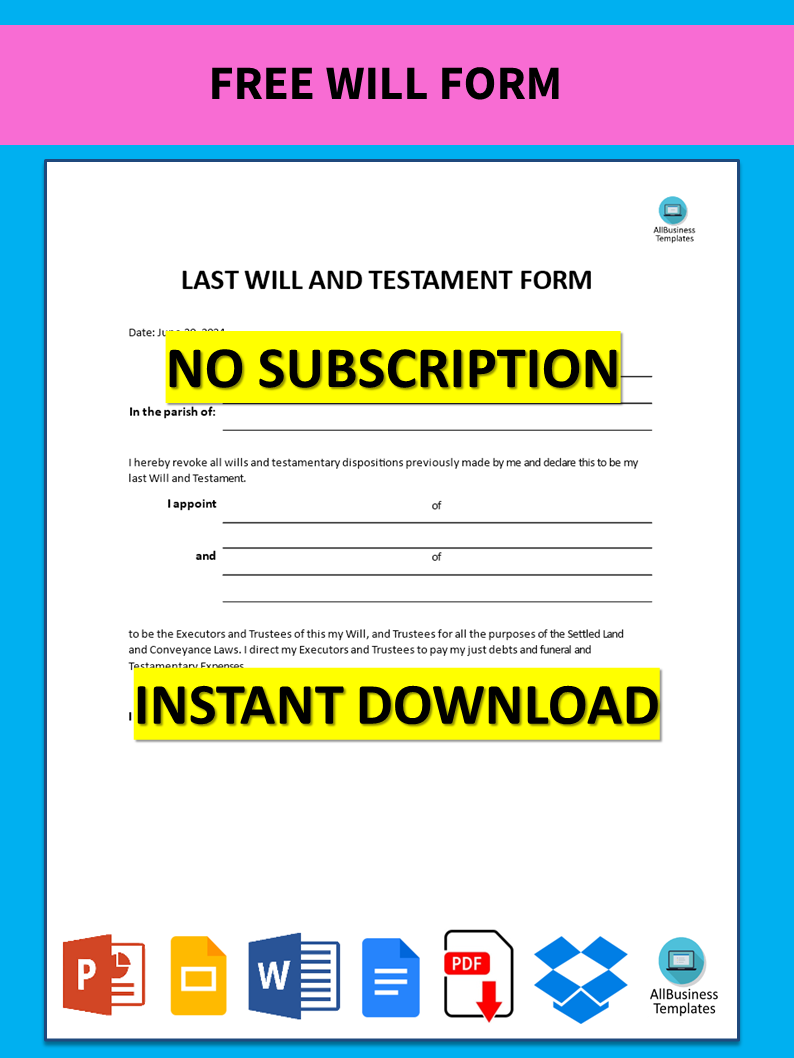Free Will Form
Sponsored Link免费模板 保存,填空,打印,三步搞定!

Download Free Will Form
微软的词 (.docx)免费文件转换
- 本文档已通过专业认证
- 100%可定制
- 这是一个数字下载 (28.05 kB)
- 语: English
Sponsored Link
What is the process for filling out a form template known as the last will form template? Are you in need of a template that you can use for making your last will? Our template is tailored to your needs so it would be able to cover all the information that you would need to have included. Our forms make it easy for anyone and they only consume a few minutes of your time.
A last will form is a legal document that enables a person (known as the testator) to outline the distribution of their assets and estate once they die. It also allows them to nominate an executor to manage the property implement the will, and appoint guardians for any minor offspring.
Below are the main aspects to bear in mind:
- Personal Data: Complete legal names, physical addresses, and testator identification. Assertion concerning the testator’s sound state of mind and will-making intention.
- Invalidation of Previous Testaments: Inclusion of a clause that repeals any existing wills or codicils such as alterations of former wills.
- Appointment of the Executor: The person’s executor’s name and contact information. Moreover, it belongs to a person who takes care of all the state matters involved in its administration. If the first nominated executor is unavailable or unwilling, name an alternative person.
- Distribution of the Assets: How the bequestor's belongings should be distributed to their rightful owners. This should include specific legacies such as specific bequests in favor of people and organizations receiving some items donated by others or individual parts of the testator’s estate for their future benefit.
- Appointment of guardian for minor offspring if both parents die.
- Instruction on how to dispose of all properties left over after particular legacies have been distributed.
- Formation of any needed trusts for taking care of and safeguarding the resources intended for recipients.
- Funeral Material: Testator’s preference on burial, cremation, and funeral.
- Particular Sign Profile: The testator puts his sign that confirms the authenticity of the will and shows the date when he signed. The testator’s capacity and voluntariness are confirmed by any two of the witnesses present at his signing.
Legal Concerns
- State Laws: Wills must comply with state-specific laws, which can vary widely. The form should ensure that it meets all legal requirements particular to the vicinity.
- Capacity: For a will to be made, the maker should often be above 18 years old—they must also be mentally sound as well.
- Witnesses: Except in rare cases where it is unavoidable, anyone being a witness should not benefit from the said will; besides, they should be eligible to take on that role according to the laws of their state.
Pros of will form
- Estate distribution control—giving the testator authority to say exactly where all his properties go.
- Guardians appointment—naming legal guardians for minor kids which creates assurance
- Documenting and stipulating the testator's needs helps avoid disputes among heirs
Cons of will form
- Complicated Estates: This might not be enough because there are more detailed estates that need extra work like tax planning or business succession planning.
- Legal help: A generic form without legal advice may have gaps or errors leading to its invalidity or open to legal cases if challenged.
A last will form is an important document in terms of ensuring the last wishes of an individual are respected and their estate is distributed as they would have wanted. For simple estates, a simple form may work but for more complicated cases it is advisable to consult an attorney; this way you will make sure the will is legally binding and covers everything necessary.
Click directly on 'Open with Google Docs' or download our sample last will form template as a Word template now to enhance efficiency! Your success in delivering a well-structured and effective last will form awaits.
DISCLAIMER
Nothing on this site shall be considered legal advice and no attorney-client relationship is established.
发表评论。 如果您有任何问题或意见,请随时在下面发布
相关文件
Sponsored Link




